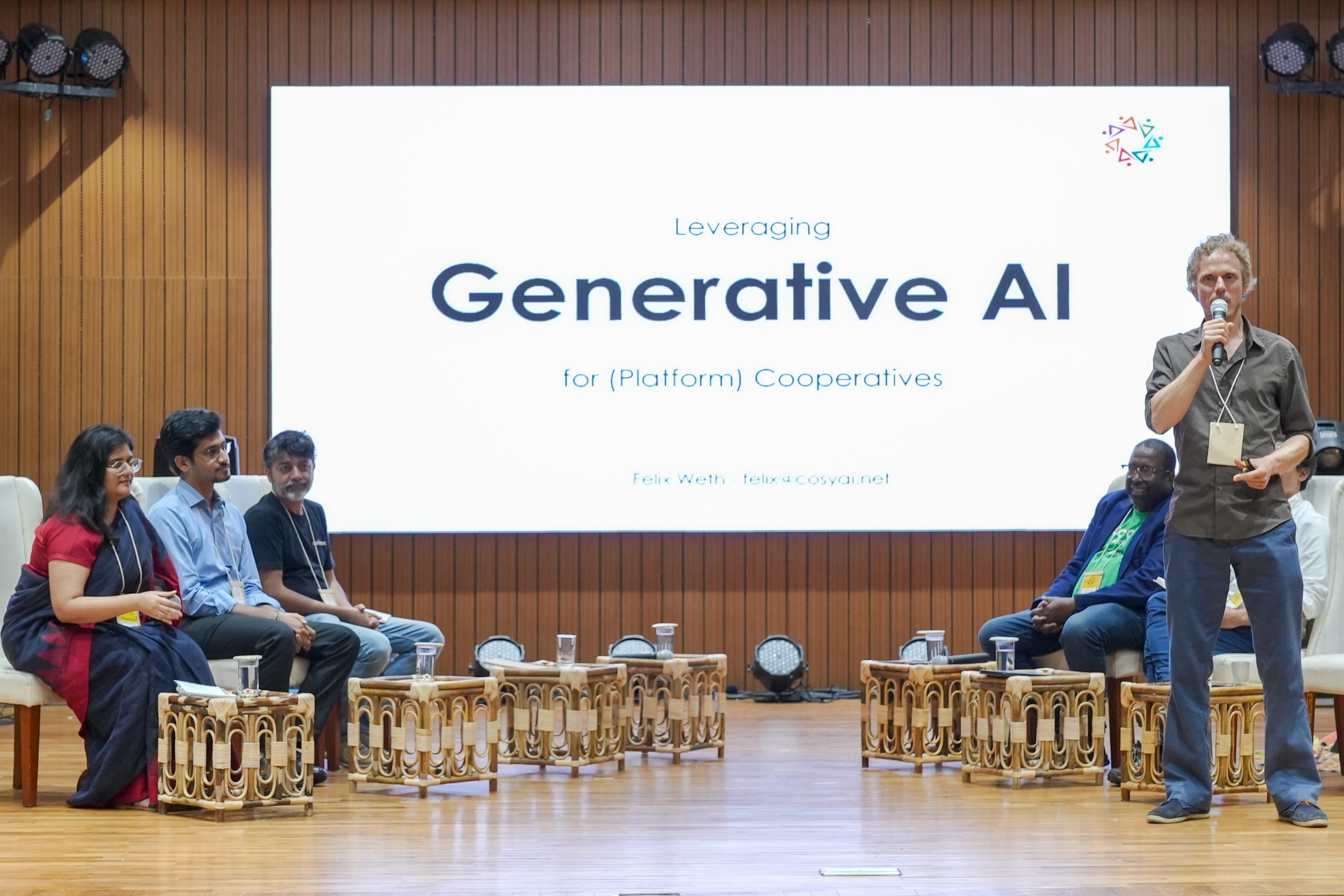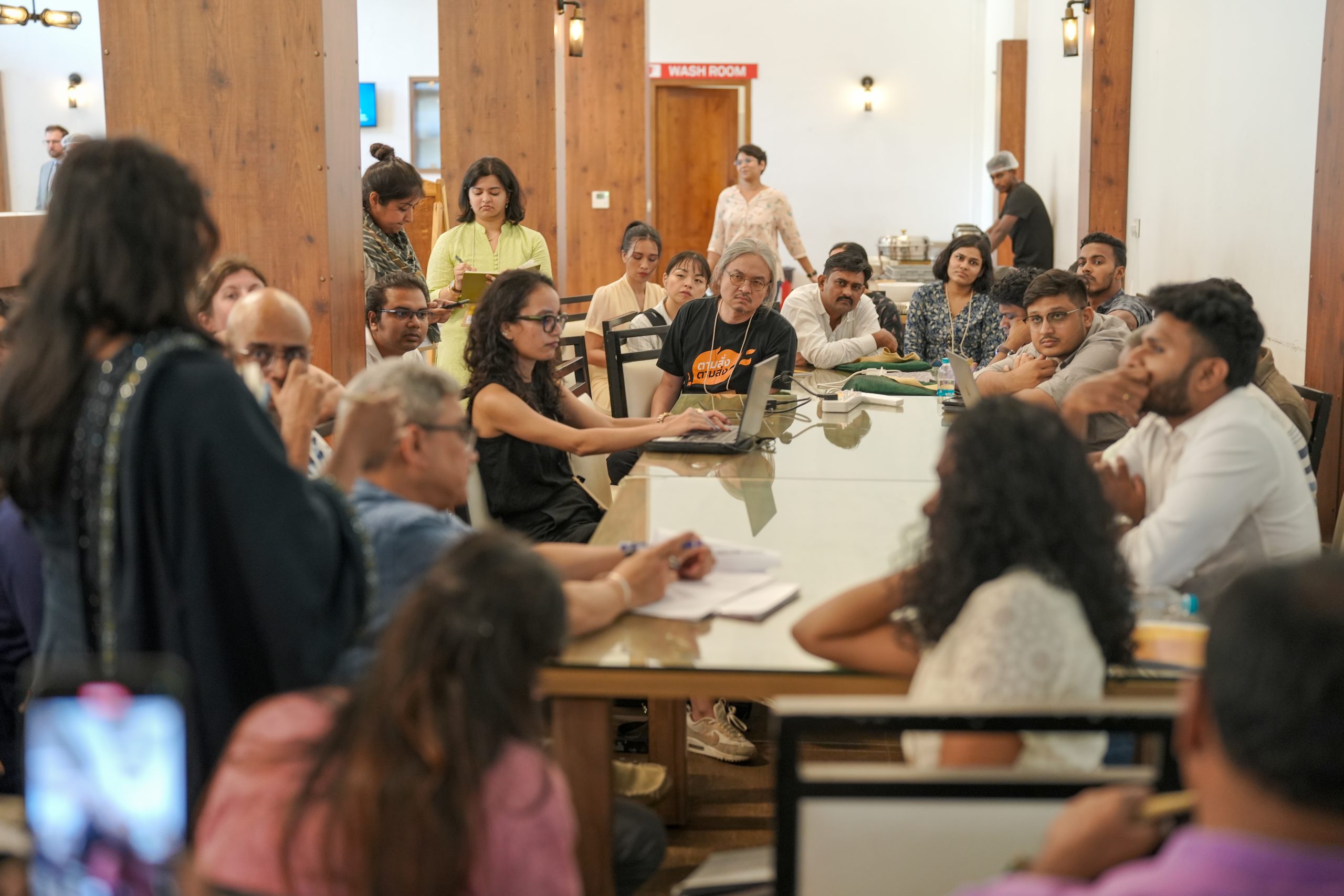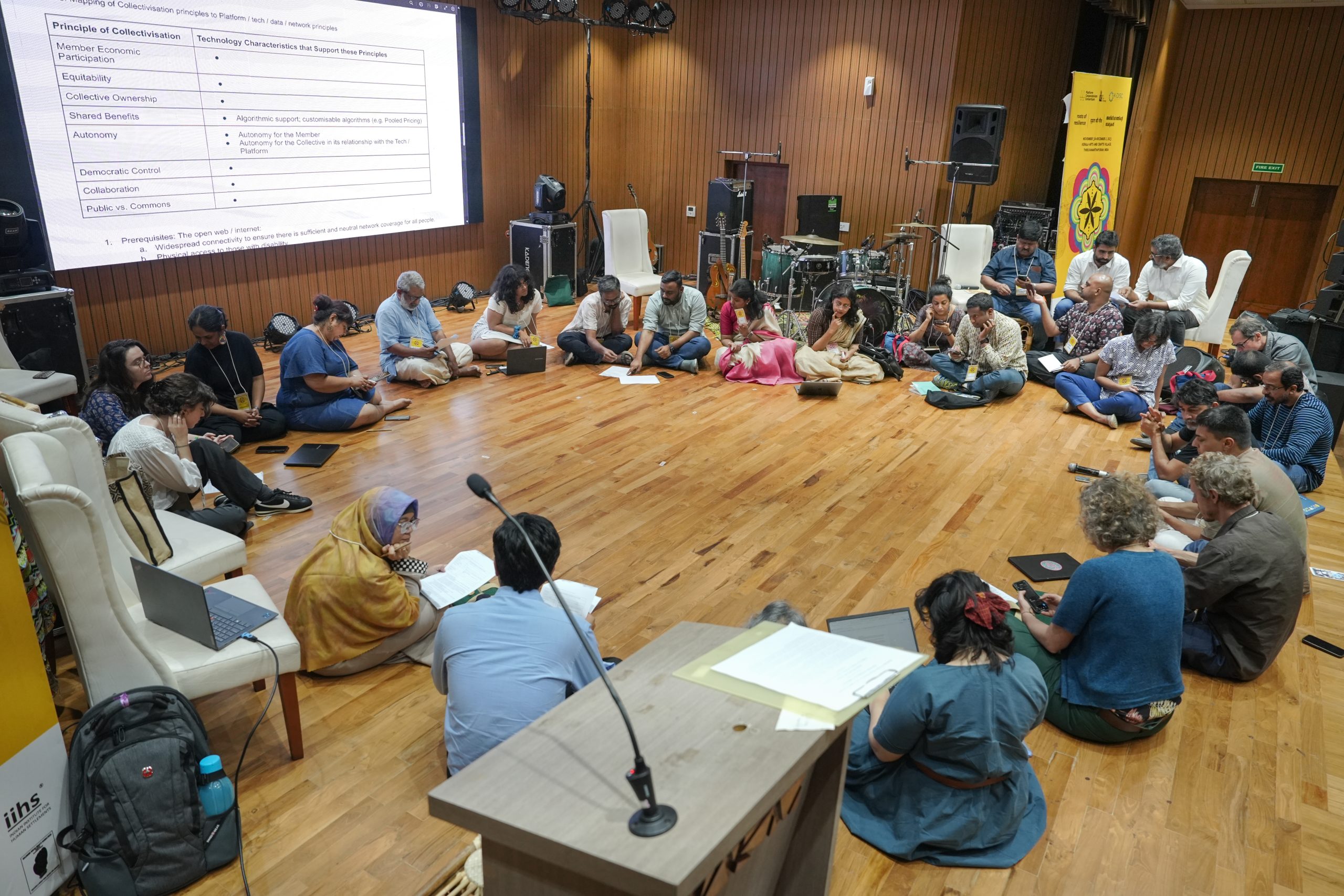The digital landscape is undergoing a profound transformation with established infrastructures of information creation and exchange gradually yielding to corporate interest. The diminishing presence of public options due to the dominance of large platforms, alongside a changing funding framework that prioritizes corporate stakeholders, has propelled the ascent of platform capitalism. This evolution has not only undermined labor rights but has also facilitated the enclosure of common data to fuel profit motives. As we witness the pervasive expansion of the platform economy into every facet of society, it becomes imperative to envision a new trajectory that addresses the substantial material detriments faced by marginalized communities. In this context, platform capitalism has not only reshaped economic paradigms but has also deepened societal inequities, intensifying challenges related to dignity, justice, and exploitation in labor markets, while heightening environmental burdens with far-reaching consequences.
Platform Cooperatives: A New Way Forward
Having explored the challenges posed by corporate dominance and its detrimental impact on labor rights and data ownership in today's platform capitalism, it is imperative to consider alternative models that empower individuals and communities.
The concept of cooperatives requires an urgent, critical capture of the new and emerging forms of labor, capital accumulation, and resource use, which arise within the paradigm of platform capitalism we are in today. While a cooperative can be termed as “an autonomous association of persons united voluntarily to meet their common economy, social and cultural needs and aspirations through a jointly owned and democratically controlled enterprise,” if we want to optimize the platform economy for the many instead of the few, we must attend to new realities, such as the platform-based organizational structure of labor and our economies.
The platform coop is a model that provides support to fight back against the inequalities perpetuated by monopolistic Big Tech platforms. It also allows people to collectively organize against ceaseless data extraction of our habits, spending patterns, and our deepest selves for the profit of platform giants, and surveillance of us and our communities. Platform coops provide ways forward to decide what happens to our data on these platforms.
The Roots of Resilience
IT for Change, in concert with the Platform Cooperativism Consortium, and the Kerala Development and Innovation Strategic Council came together to explore how the platform coop model can promote feminist futures, climate justice, and sustainable agriculture through the 10th iteration of the Platform Cooperativism Conference. The conference, aptly titled, ‘Roots of Resilience’, brought together member cooperatives (both traditional and digital), researchers, engineers, policymakers, union leaders, etc., to Thiruvananthapuram, India to discuss both the current challenges facing the running and legislating of platform coops, as well as the future imaginations of just, equitable futures built through platform coops. The conference was organized from 30 November to 2 December 2023.
Snippets from the Roots of Resilience conference
Participants at the conference highlighted real-world growing pains of platform cooperatives through a range of sharing sessions. Thematic sessions allowed practitioners to deliberate on prescient challenges through their unique points of view and formulate plans for the future. Across the diverse threads of conversations, certain ideas appeared and reappeared. These ideas, at their core, were about sustainability and the possibility of building feminist economies. The impulse towards building sustainable and feminist economies builds upon the tenets of cooperativism, making visible the productive labor necessary in cooperative movements, and translating those tenets into the new digital ecosystem.
These two impulses can be further broken down into principles that call for reorganizing our extractive economies into social and solidarity economies.
Below are some of the principles drawn from our collective learnings through the conference:
A worker-owned, platform firm model based on traditional cooperative principles that will be recovered in both discourse and practice.
The state of our economies, to a large extent, has come about from the exertion of might by the most powerful. Such is true of platform capitalism as well. Widespread platformization is imminent as platform capitalism continues to weave its tendrils into every avenue of people’s lives. If unchecked, large platform corporations will continue to coopt power, extending their reach further into our lives. We must approach platformization, therefore, with an eye to the history of alternate forms of economic organization. The principles of cooperativism remain evergreen to ensure our futures are beneficial for the many and not the few; an emphasis on democratic governance, social impact, and shared responsibility.

As Tortorici asserts, alternative values should prioritize good working conditions and embrace the best practices currently accessible to us. The cooperative model stands as an experiment that has demonstrated its success in ensuring precisely that. From our discussions, we have expanded on what these values look like in cooperativist organizations. It is essential to build platform models that abide by the following cooperativist principles:
- Democratic organization
- Open admission
- Shared ownership
- Participatory management
- Member stakeholdership, not shared capital
- Equity options rather than debt-based financing or venture capital
- Readiness for a production paradigm transition—to leverage data-based intelligence, responsibly and contextually
- Digital innovation ecosystems that support public and social value—an innovation that works for micro, small, and medium enterprises (MSMEs), local self-government institutions, and people’s organizations
An economy of belonging and balancing production and reproduction through care, sustainability, and mutualism.
Fairwork’s annual ratings for labor standards in the platform economy for 2023 found that there are no large gig work platforms in India that pay local living wages over work-related costs. Furthermore, even though some platforms have begun providing feedback mechanisms and human evaluations for automated decisions, these only function on the level of the individual workers. None of the surveyed platforms have shown a willingness to recognize a collective body of workers. Gig work—one of the dominant contracts of labor produced by the platform economy—is sustained through a high-volume churn of meagerly paid contractors with no grievance redressal mechanisms to influence the conditions of their work.
These new types of workers are paid wages that lead to precarity and estrangement; the conditions required to live grow further and further out of reach, and workers are forced to disconnect from their communities, from participatory democratic practices, and from belonging in the world in order to work.
Coop Spotlight:
Emma Back, from the Equal Care Coop, highlights how self-determination, and local autonomy at scale drive her cooperative. The Equal Care Coop is a platform cooperative that allows care receivers to set up and manage both their physical and remote care team; paid care workers, family members, volunteers, and more. The platform ensures a mutual match between those receiving care and those who provide it. It aims to alleviate the perception of care work through the platform layer. Back introduces how the cooperative's platform brings different stakeholders in disparate places and situations together to address the central question of providing effective care. The platform also allows team members the freedom to control their own time and labor, emphasizing how this breaks from the often restrictive and infantilizing nature of traditional care work. The platform used by the coop re-orients the understanding of care work, prioritizing ways to organize work according to the care workers’ needs and desires. This, in addition to the increased wages offered by Equal Care Coop, provides an example of how to build an economy of belonging.
Design and use cultures that generate and reinforce a productive and accountable dynamic between public- and commons-based digital regimes. This requires a normative shift toward tech-licensing models grounded in a copyleft or commons logic to prevent the cannibalization and/or expropriation of hard-earned, cooperativism-led contributions of global pools of digital commons by capital.
The architects of our very experience on the internet—and our access to it—are built in large part by the five tech giants: Apple, Alphabet, Amazon, Meta, and Microsoft. The enclosures of the data we produce and the tools we use puts us in a precarious position where the vision of owning the profits of our production slowly dwindles.
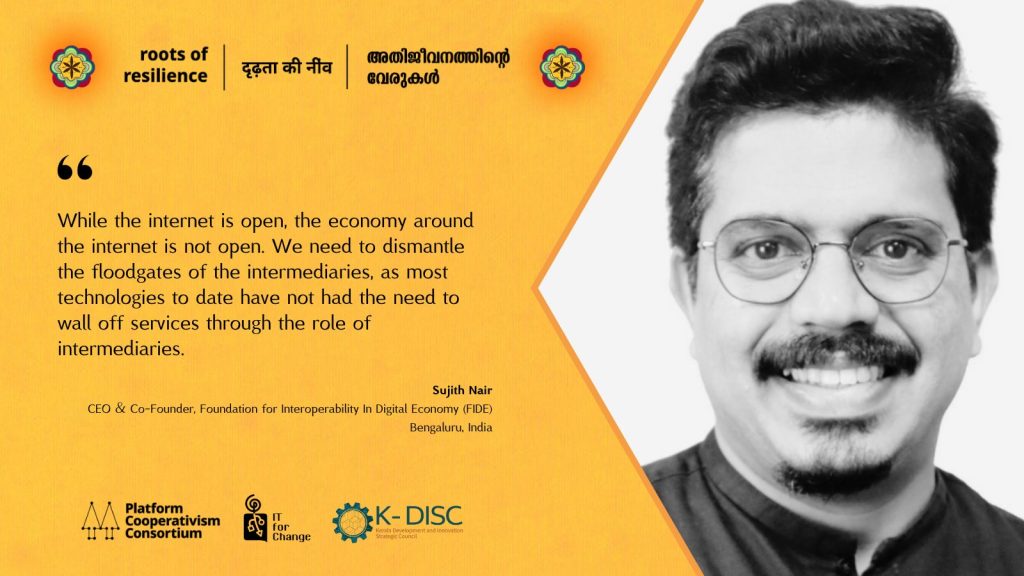
However, the structure of the internet is not immutable. The internet did not always fall under corporate control, and its evolution encompasses the history of public services. The software that constructs what we recognize as the internet can be developed incrementally, shared, and redistributed based on agreed-upon regulations for the common good. These principles are rooted in common-based software practices, and as we strive to democratize technology, we must carefully consider how cooperative principles should guide our strategies for open digital software. When transitioning to tech licensing models, institutions must prioritize data creators' ownership of the data and software generated from their efforts. This is crucial to prevent corporate entities from exploiting such data for their own financial gain, as is often the case in our existing systems.
Solidarities should be forged across movements, including the cooperative movement, trade unions, feminist movements, and climate justice movements, to counter the existing hegemony of platform capitalism.
Platforms bank on the atomization of the worker and their spatial and geographic displacement, as well as the competition each other worker represents to quash meaningful solidarities. However, as Jessica Gordan Nembhard, Professor at City University of NY, highlights, cooperation has historically been our first economic system. It is something we have consistently returned to, across every society and civilization, as a way to organize our economic activity.
Economic inequality and exploitation have historically, often led to resistance, which manifests as solidarity and cooperative economics. The values Nembhard highlights in her interview are bound together by the striving of disparate groups for the common good. Despite being in oppressive systems, it is imperative to adopt these values as a means of confronting and resisting the oppressive dynamics inherent in platform capitalism.
An acknowledgment of cooperativism in the digital age as not a fringe alternative but a mainstream economic choice for local to global markets.
The largest technology players have amassed enormous chunks of markets and catapulted themselves to stratospherically large profits through a combination of anti-competitive strategies to push rivals out, dominant algorithmic manipulation, and lobbying for deregulation to aid their growth. This has left MSMEs in the lurch, often unable to compete with these large corporations or unable to afford the services enclosed by these corporations which have become essential to inventory management. Under the current paradigm of platform capitalism, there is no alternate imagination to reach the market for MSMEs to scale, optimize supply chain management, and engage with both local and global markets.
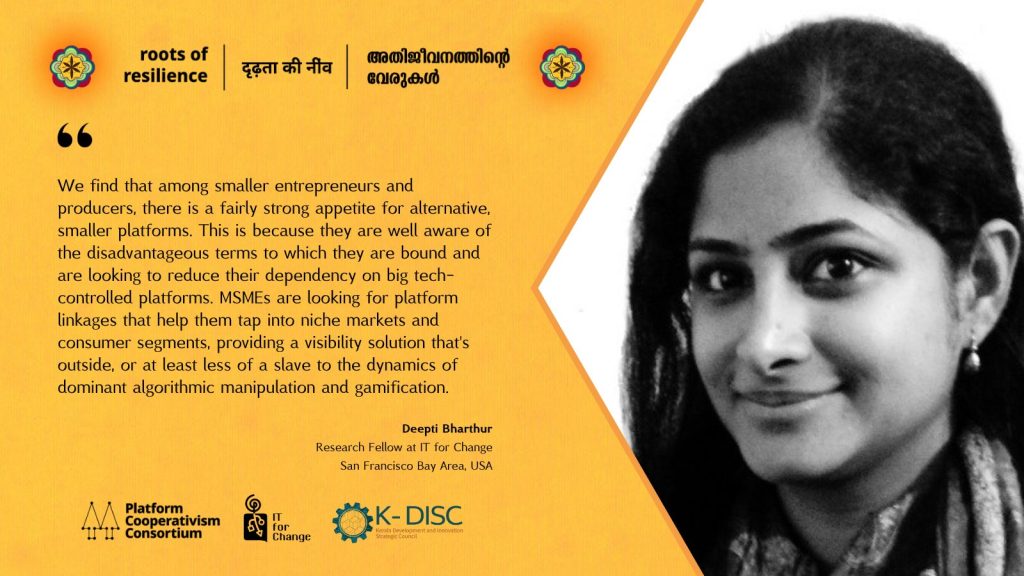
The digitalization of markets across the world requires institutions that encourage digital innovation ecosystems that support the specific needs of MSMEs—ability to capture new forms of investment, find new markets and consumers, and receive support to sustain enterprises. Cooperativist institutions, with their emphasis on open admission, and equity-based, rather than debt-based financing, provide a much-needed alternative. Our economies cannot cannibalize themselves through monopolistic takeovers, and the enclosure of services to big players. Cooperativism must figure as a prominent alternative to build sustainable economies open for all.
But how do we actually get to implementing these principles and building the aforementioned sustainable and feminist economies? The constructive debates among our participants highlighted certain ways forward to facilitate the expansion of platform cooperativism.
Below are three important changes we must make.
Engendering Vibrant Cooperative Tech Ecosystems
×There must be a ground-up investment to re-imagine the technology infrastructures we use to engage in digitalization. The tools through which platforms are currently built rely on a set of information and technologies that only serve the interests of private for-profit platform corporations. Discussions from policymakers, activists, and technologists have marked out three interventions we must engage with if our feminist futures are built with tools, and data that profit the many and not the few.
a. Public data exchanges and common data spaces must be created, governed by the participation of public data creators, to generate public value that all people can benefit from.
The ground norm of ‘no data about us without us’ must serve as a foundational principle guiding data governance practices. These practices can involve data exchanges facilitated and overseen by local government units in collaboration with citizens, which may vary in scale and structure but prioritize inclusivity and citizen participation. Such data-sharing mechanisms should operate within legal frameworks that ensure fair access and usage across different scenarios, including government-to-government, government-to-community, and business-to-government interactions. Particularly in key sectors, public institutions have the authority to require private sector entities to pool high-priority datasets, allowing for the creation of public value from shared data resources.
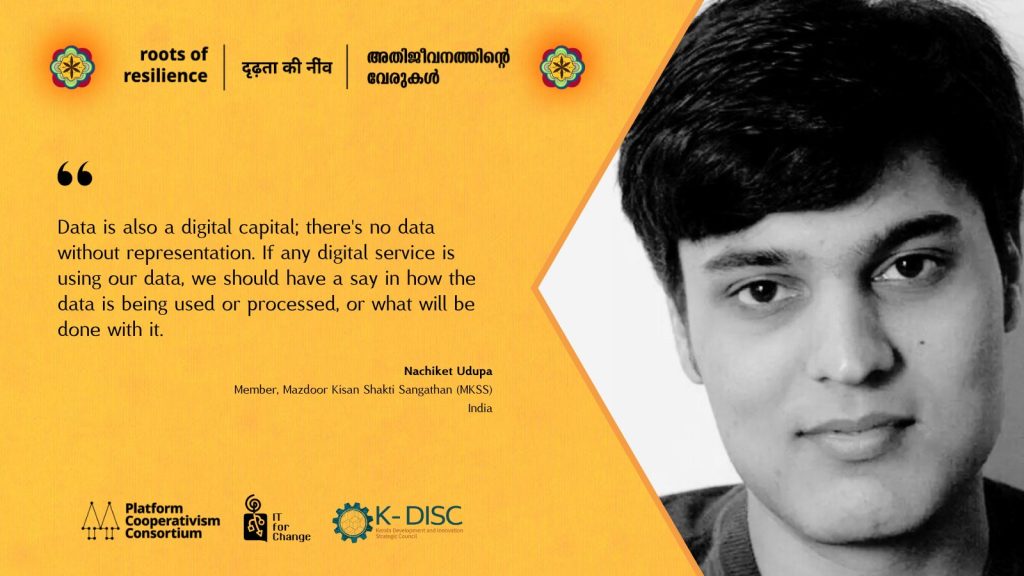
Additionally, cooperative-owned data infrastructures enable digitalizing cooperatives to benefit from the knowledge of data pooling initiatives within cooperative movements. The approach, based on tenets of democratic governance, allows for negotiation and bargaining, both within and through the cooperatives, ensuring power is not concentrated in the hands of a small handful of board members or people whose central goal is the profit motive. Data pooling is inevitable, but workers' voices and concerns around data sharing and how to store, use, and profit off of data build on questions about lived realities and the intersections that affect how value is built around their data.
b. Public policies must provide the infrastructural base for cooperatives and enterprises. They must enhance data accessibility measures, and support initiatives that digitalize public schemes and initiatives that connect public sectors.
Techno-design strategies rooted in interoperable, open, and commons-based protocols must play a pivotal role in actualizing the right to data accessibility. This approach extends to fostering spaces for digital commoning and innovation, akin to the women's collectives in Kerala that operate digital service centers under the publicly endorsed Akshaya model. Furthermore, we must look to platform commons initiatives emerging in primary sectors that emphasize federation and interconnection.
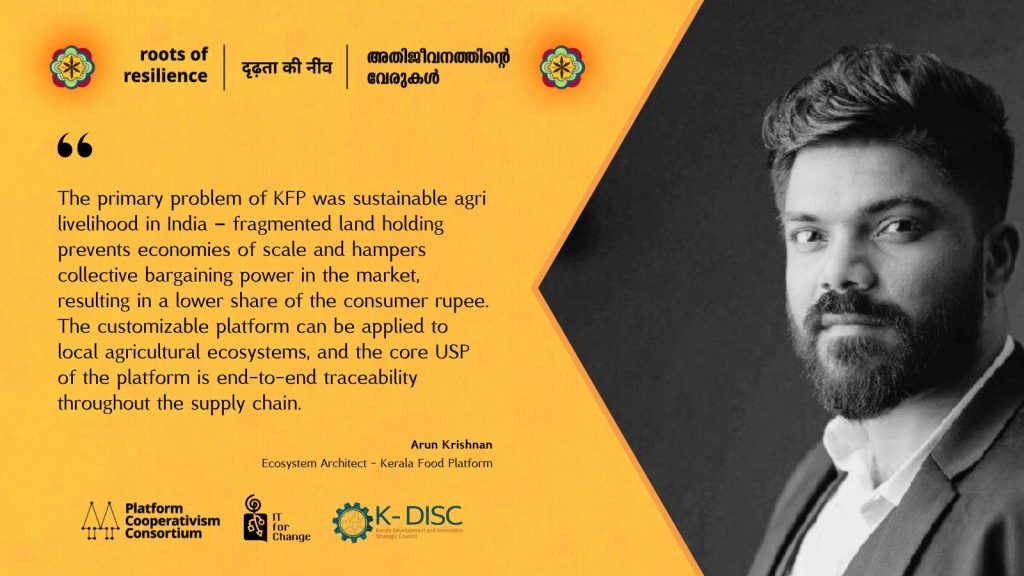
For example, scalable pilots, such as the Kerala Food Platform, demonstrate the potential to expand and connect various initiatives within the platform commons framework, fostering collaboration and shared benefits across sectors.
c. Feminist infrastructural design that emphasizes attention to the intersectional factors of design and infrastructures which create barriers for marginalized users.
At the heart of the storm of platform capitalism is the infrastructure of the platforms themselves. The administration of the systems is encoded with the profit-motive of platform companies. It is the design of the platforms that discipline workers for the corporation’s profit. In order to build feminist futures, we must reconsider how tech infrastructures can be co-designed according to feminist principles.
“What does it mean for a server to be administered in a collective feminist way? System admins are gatekept, which is especially troubling considering servers run our world right now. The notion of the feminist server is not enmeshed to the capitalist agenda: a feminist server is one which can go down, one which has infrastructure solidarity.”- Padmini Ray Murray, Design Beku
The effective design of platforms must involve several key considerations:
- The need to accommodate the unique requirements of different sectors and local contexts;
- the adoption of contextually relevant design principles that empower users, regardless of their digital literacy levels, through intuitive interfaces and workflows;
- prioritizing the well-being of all ecosystem members over mere efficiency metrics;
- dismantling barriers to entry and exit from data infrastructures while ensuring transparency regarding data usage;
- implementing processes for notifying users about changes in engagement terms and algorithmic designs;
- granting users autonomy in their interactions with intermediaries and technical infrastructures;
- establishing fair participation and usage policies to lower costs and promote affordability;
- facilitating network linkages among cooperative federations to enable collaborative product sales rather than relying solely on intermediaries in open networks; and
- ensuring the representation and inclusion of marginalized groups in membership and decision-making processes across all infrastructure layers.
To realize feminist futures within tech ecosystems, we must champion public data exchanges, embrace cooperative-owned data infrastructures, and design platforms based on feminist principles of inclusivity and transparency. These actions not only democratize data access and usage but also foster collaborative innovation and prioritize the well-being of all stakeholders. Ultimately, our path forward lies in reshaping tech infrastructures to serve the collective interests of diverse communities and advance social equity.
Creating an Enabling Policy Environment for Cooperative Digitalization
×As digitalization becomes inevitable for cooperatives, we must build institutions and governmental-level practices that support such experimentation by safeguarding workers and cooperatives from being captured by large platform corporations.
a. Regulatory governing bodies must build mechanisms to support the cooperative vision.
In order to withstand the monopolizing tendency of large platform corporations, collectives need support through compliance policies and access to digital technologies facilitated by governing bodies. This would ensure that they function and scale in ways that do not mimic the corporate profit-motive structure.
Establishing access to digital technologies involves more than just offering programs to enhance digital literacy among cooperative members, enabling them to navigate and make informed decisions about suitable platforms. It also entails creating repositories of open-source and collectively owned digital technologies, empowering cooperatives to determine how their data is managed. Expert bodies like cooperative ministries should oversee these initiatives to enhance digital access and utilization among cooperatives. Additionally, central and state agencies need to closely monitor how digitalization is reshaping value chains, particularly in sectors like transportation which has been transformed by the introduction of ride-sharing apps. These new regulations should prioritize safeguarding cooperative principles and ensuring equitable value distribution, particularly amidst predatory practices in digital marketplaces. These context-specific regulations and policies must prevent monopolistic platforms from exploiting cooperatives or creating value disparities. Such a comprehensive strategy is essential for fostering the resilience and sustainability of cooperatives in a rapidly evolving economic environment.

Such mechanisms can be built in cooperation with both governing bodies and civil society institutions. The Association-La Coop des Communs is one such example. La Coop des Communs has built an ecosystem of cooperatives to build a space for cooperatives to come together and guide each other through digitalization. Institutional mechanisms from the state, however, must also be enfolded into this ecosystem, ensuring support across scales of work. La Coop des Communs members share cooperative values, imparting them to new members and strengthening them in established coops. Such mechanisms ensure that predatory digital platforms cannot capture cooperatives.
b. Universal Welfare and social security policies must protect against unstable markets, which allow informal workers safety nets and cooperatives space to attempt experiments in models for equitable growth.
The form of labor contracts the platform economy regularly engages workers under is one where the employment benefits are snatched out from employers. Traditional safety nets that came from employment such as medical insurance, pensions, contributions to provident funds, etc., are creatively withheld. In the larger era of neoliberal austerity measures worldwide, government schemes largely do not protect workers as they go through periods of under- and unemployment, or as cooperatives build out new functionalities.
If governments want to support sustainable economies at scale, there must be a re-orientation towards building out safety nets so workers can find and build more sustainable economic futures for themselves, their sectors, and their communities.
c. Efforts must be made to ensure that all people, particularly historically marginalized groups, have access to policies and programs that provide the skills necessary to negotiate their individual and collective digital futures.
Policies and programs aimed at advancing digital societies must focus on fostering civic intelligence and building community trust. This involves ensuring that the right to internet access is not just nominal but meaningful and substantive for all individuals. For example, as part of the Kerala government’s work to engage with digitalization across rural Kerala, the first digitally literate village, Pulampara, was established. The program brought down barriers to internet access, and expanded progress metrics beyond the government's educational focus towards digital literacy, emphasizing long-term engagement. Initiatives were established to help local youth envision a digital future for themselves. This sets the stage for people to substantively envision themselves as being participants in the digital world.
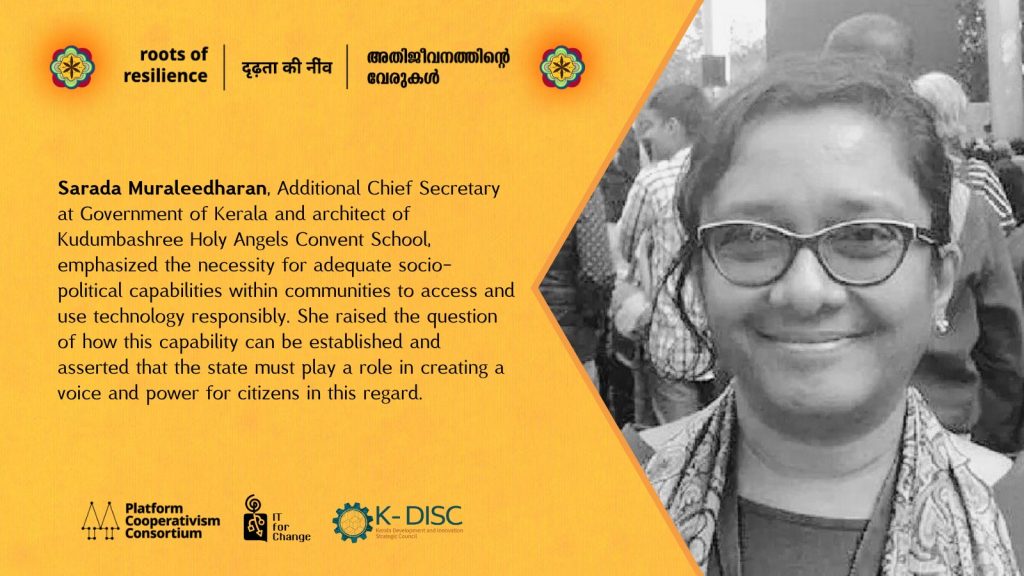
Additionally, there should be a concerted effort to nurture a local democratic ecosystem that prioritizes the voices of marginalized social groups and recognizes the pivotal role of local governments in driving innovations in platform cooperatives. Furthermore, educational curricula should be revamped to create new modes of high-quality learning, enabling every citizen to develop the skills required to navigate their digital futures both individually and collectively.
Building Institutional Capacities to Contest Digital Economy Principles
×The rapid growth of gig work in the digital age has brought to light the urgent need for regulatory environments that protect the interests of gig workers.
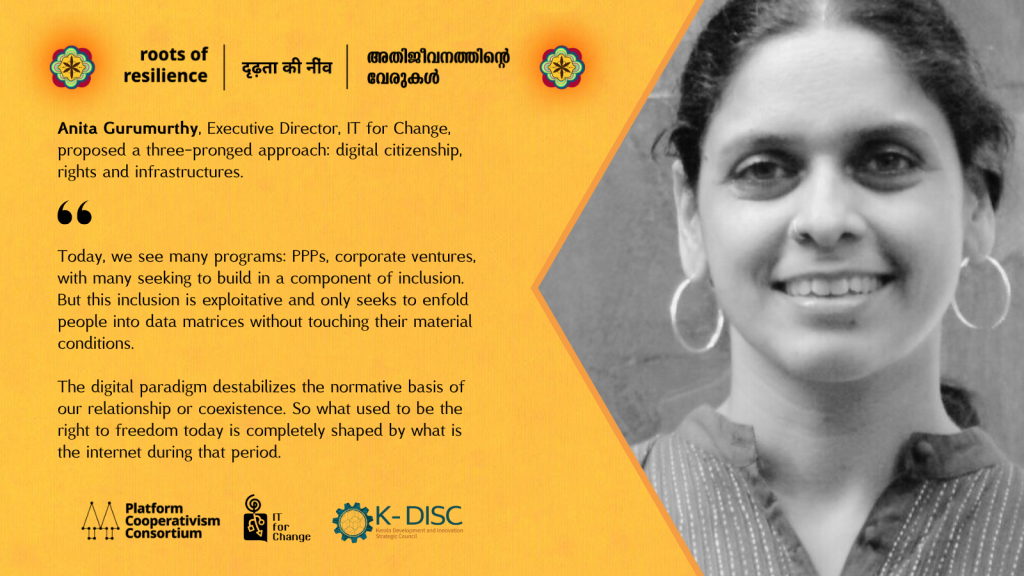
In response to these challenges, there must be recommendations on appropriate legislative changes made to keep up with our changing tech and policy landscape. However, we must also critically re-examine how current legislation can be realized in new tech environments.
a. Regulatory environments that protect the interests of gig workers.
A compilation of recommendations resulting from discussions during the conference among gig workers’ union leaders, jurists, and activists convening to deliberate on the future of gig workers has underscored the following recommendations regarding the regulation of laws to safeguard gig worker interests:
A robust regulatory framework is imperative to safeguard the rights of gig workers, encompassing several key aspects:
- Gig workers should be recognized as, at least, semi-skilled workers, and regulations must be in place to ensure they receive minimum wages.
- These workers must have the freedom to associate, fair wages, decent working conditions, access to social security benefits, occupational safety measures, protection against sexual harassment, algorithmic audits, accountability mechanisms, and rights over their own data.
- There should be modalities for collective bargaining and official recognition of platform work unions by digital transnational corporations.
- Both central and state-level legislation, similar to the initiatives undertaken in Rajasthan, and proposed in Karnataka, should be implemented, covering various elements of worker rights and establishing grievance redressal mechanisms. This comprehensive approach is crucial to address the diverse needs and challenges faced by gig workers in the modern digital economy.
b. The deployment of existing regulations and protections in new tech environments.
Utilizing existing regulations and protections in new tech environments is crucial in reigning in dominant transnational digital corporations and fostering spaces for alternative digital economies as new directives and policies struggle to come into existence. For example:
- Leveraging consumer rights protection creatively can challenge dark patterns that ensnare consumers into predatory profiling.
- Competition regulation plays a vital role in preventing Big Tech from cannibalizing or capturing non-profit/commons initiatives.
- Implementing differential compliance thresholds can rectify inequalities in compliance burdens between corporations and cooperatives. This addresses the paradox where corporations often face lighter penalties while collective enterprises bear heavier burdens.
c. Data governance built on the principles of redistributive justice.
Transitioning from the individualistic 'privacy and consent' paradigm to a comprehensive framework is essential to protect the collective rights of vulnerable communities in the data economy. This shift involves ensuring that state-level interventions like Agri Stack, Edu Stack, and Health Stack are not monopolized for private gain, but instead foster public value innovation. Additionally, developing policy frameworks that facilitate public data accessibility for citizen-led social audits and people's science initiatives is crucial for transparency and accountability.
"Consent is thrown about as a solution, but consent falls short. Whether it’s about drafting policy or designing systems, farmers must have a seat at the designing and negotiating table." - Nachiket Udupa, MKSS, on the digital opportunity for agri livelihoods.
Furthermore, in cases where consent for data collection, use, and sharing cannot be freely given, alternative mechanisms such as a voting system, or group arbitration can be considered. This approach retains some organizational powers with workers and moves beyond a simplistic 'yes or no' answer. Emphasizing inclusive decision-making processes enables genuine engagement and addresses concerns about false choices. Ultimately, these measures serve as a starting point for open discussions and the establishment of fair and participatory governance structures.
The discussions and insights shared during the ‘Roots of Resilience’ conference have presented hopeful pathways forward. Platform cooperatives emerge as a viable solution, empowering individuals and communities to take control of their economic futures while promoting sustainable, feminist economies.
The principles discussed, including centering social reproduction in production, building commons-based digital regimes, fostering solidarities against platform capitalism, and creating an enabling policy environment, offer roadmaps for navigating the complexities of the digital age. By investing in cooperativist tech ecosystems, designing feminist infrastructures, and advocating for regulatory frameworks that protect gig workers and promote collective rights, we can work towards a more equitable and just digital economy.
The Thiruvananthapuram Declaration, unveiled during the conference, represents a pivotal opportunity to translate our collective vision into actionable steps. By endorsing the Declaration and rallying support from stakeholders, including governments, policymakers, and civil society, we can amplify the voice advocating for an alternative vision of our future. This is our chance to make meaningful strides towards a digital economy that prioritizes people and the planet over profit, fostering inclusivity, sustainability, and social justice.
Let's come together and ensure that the principles outlined in the declaration are not just ideals but tangible realities that shape policies, initiatives, and practices across the globe. Endorse the Thiruvananthapuram Declaration today and join us in building a more equitable and cooperative-driven future.
This article was visually designed and developed by Intifada P. Basheer.
The research for this article was co-funded by the European Union and Friedrich-Ebert-Stiftung.

